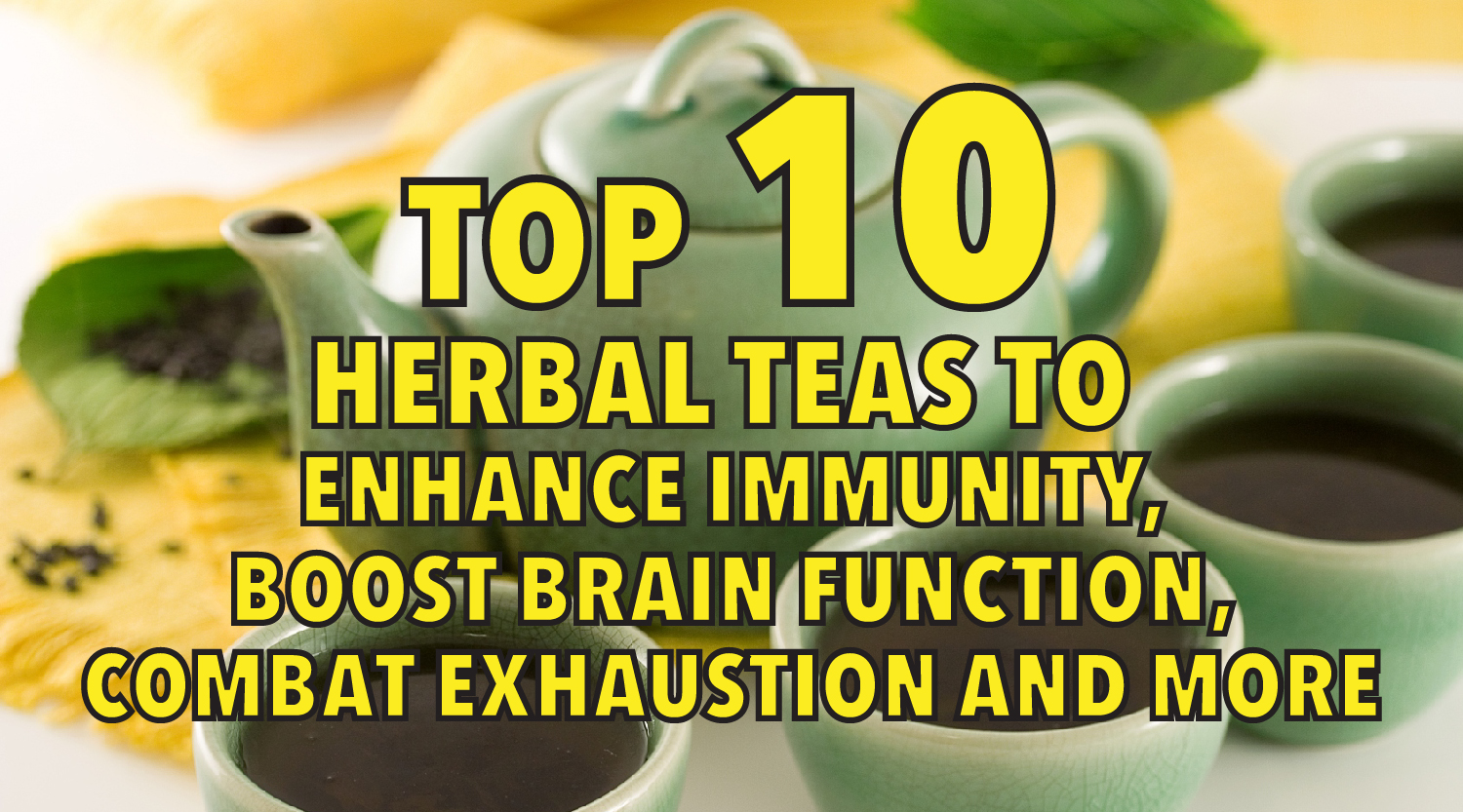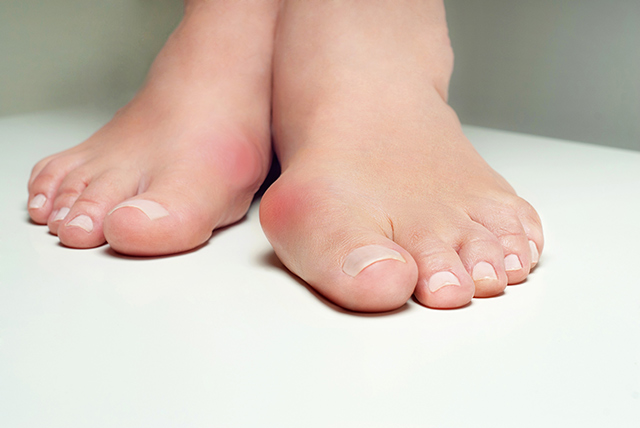Top 10 herbal teas to enhance immunity, boost brain function, combat exhaustion and more
07/17/2015 / By Greg White

It’s been jokingly said that an Englishman would interrupt a war to have his afternoon tea. Herbal tea is one of those universally appreciated beverages consumed in nearly every culture. It can be served year-round hot or iced. Yet herbal tea isn’t enjoyed just because it’s palatable. It’s been seized by communities to enhance immunity, boost brain function and combat exhaustion, among other health benefits, for centuries. There are many herbal teas made from herbs around the world. Reap the health benefits of herbal tea today with these beloved beverages.
1. Mint tea
Mint tea has a pleasant aroma and is known as a breath freshener. There are many health benefits attached to mint tea too. The strong aroma of mint tea can help sooth a sore throat and provide relief to respiratory problems. It’s benefits the mind as well by making you feel awake and focused. Mint tea has also been shown to be an effective treatment for irritable bowel syndrome. According to a study published in The Journal of Pediatrics, approximately 75 percent of children who were given peppermint oil capsules had reduced pain from irritable bowel syndrome. So savor the scent and drink mint.
2. Ginger tea
Ginger is a spicy tea, often mixed with honey, that is great to drink next to a fire on a cold winter day. The ginger root is the primary source of its medicinal properties. It is widely considered to be an effective treatment against nausea induced by motion sickness or chemotherapy. It also has anti-inflammatory properties that can provide relief to muscle sores and cramps. Although ginger can soothe stomach cramps, drinking too much ginger can also cause stomach problems, so try to drink this savory beverage in moderation.
The power of the elements: Discover Colloidal Silver Mouthwash with quality, natural ingredients like Sangre de Drago sap, black walnut hulls, menthol crystals and more. Zero artificial sweeteners, colors or alcohol. Learn more at the Health Ranger Store and help support this news site.
3. Lemon balm tea
Lemon balm is a member of the mint family that is grown as a crop for medicinal purposes. Considered by many to be a calming herb, lemon balm can be made into a tea to help relieve anxiety and insomnia. Its therapeutic effects extend to the mind as well: Lemon balm tea can help beat the winter blues and improve memory. Other studies suggest that lemon balm tea may help heal cold sores caused by the herpes simplex virus. Teeming with antibacterial activity, lemon balm tea also helps treat other ailments like asthma and may even boost the cognitive function of Alzheimer’s patients. This delicious tea can be served with a dash of maple or lemon syrup.
4. Raspberry leaf tea
Raspberry leaf has been labelled “the women’s herb.” As a tea, it is often recommended by herbalists to pregnant women to help eliminate cramps and control hormones. The tea can strengthen the uterine wall, which can help ease the pain of childbirth. It’s also very high in calcium, iron and B vitamins, which are important nutrients for fostering developmental growth. It’s chock full of heart healthy flavonoids as well. Raspberry tea is made from fruit and dried leaves of the raspberry plant, making it a popular summer beverage.
5. Mulberry tea
Mulberry tea is made from the leaves of the mulberry tree, which has been cultivated worldwide. It was commonly used in Traditional Chinese Medicine to cleanse the liver and strengthen vision. Today, mulberry tea can be used to help balance blood sugar, aid digestion and lower bad cholesterol. It’s also one of the few teas that has no caffeine in it. Mulberry leaves are so nutrient-dense that they can be used up to three times to make tea.
6. Chai tea
Chai tea is one of the most popular teas around. There are many different types of chai tea; however, most of them share the same health benefits. Chai tea is abundant in antioxidants, which can help neutralize cancer-causing free radicals. In addition, chai tea contains the potent anti-inflammatory eugenol, which can serve as an alternative to anti-inflammatory drugs. The spices in chai tea have been shown to aid digestion as well. Relatively low in caffeine, you can add coconut milk to this spicy beverage and serve it as an after-dinner drink.
7. Chamomile tea
Chamomile tea is an herbal tea favorite. It is often turned to as a stress reliever. So much so that many people drink it 30 to 45 minutes before going to bed in order to ensure a peaceful night sleep. It can be consumed to soothe an upset stomach and intestinal spasms. It also makes a good herbal remedy for treating diarrhea and fever in infants and children. In order to have sweet dreams, try chamomile tea.
8. Rose hips tea
Rose hips can be made into a tangy, fruity tea just in time for summer. Its health benefits aren’t limited to the summer, however. The ample amount of vitamin C in rose hips tea can ease the pain of arthritis and help prevent the common cold. Consuming rose hips tea regularly can lessen cramping during menstruation in women too. It’s full of minerals like calcium, iron, silicon, selenium, sodium, potassium, manganese, phosphorus and zinc. Rose hips tea is a valuable source of polyphenols, phytochemicals that work as antioxidants to protect cells and strengthen the immune system. Many of the nutrients can be boiled out of the fruit when preparing the tea, so it’s best to infuse the herb.
9. Rooibos tea
Rooibos tea is a naturally sweet tea with roots grounded in South Africa. The tangy beverage is capable of reducing the risk of common maladies like cancer, heart disease and diabetes. It’s touted as a rich supply of antioxidants, which can help combat the signs of aging. Commonly used in South Africa to treat various allergies, rooibos tea can also be given to children to ease stomach pains. Given the wide range of health benefits attached to rooibos tea, this thirst quencher is bound to help you in more ways than one.
10. Dandelion tea
You can pluck the dandelions from your garden and brew your very own tea. Dandelion tea contains significant amounts of vitamins A, C and D, zinc, iron, magnesium and potassium. It can help ease the congestion of the liver, cleanse the bladder and flush toxins from the kidneys. Dandelions also have a reputation for promoting weight loss. Animal tests found that rats and mice lost 30 percent of their body wight when fed dandelion extract. The compounds in dandelion tea may help normalize blood sugar levels in diabetics as well. These health benefits are what make dandelion tea, well, dandy.
Tea is a drink consumed and loved by many. Given the wide range of teas to choose from, you are sure to find one that meets both your palate and health needs. In short, drink these herbs to stay superb.
Sources include:
http://thechemotherapydiet.com
http://amazingherbsandacupuncture.com
Tagged Under: brain function, exhaustion, herbal tea, immunity




















